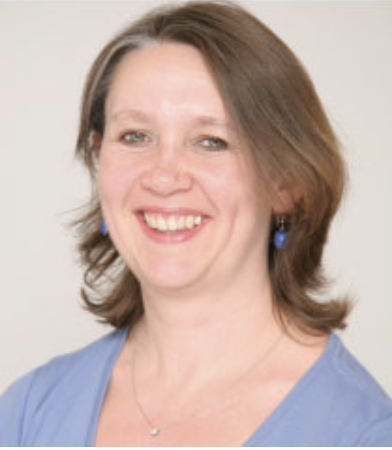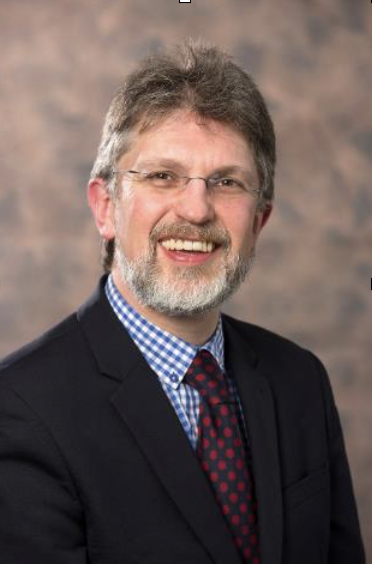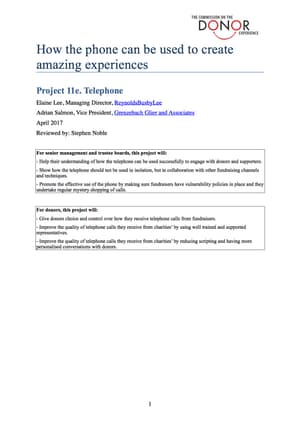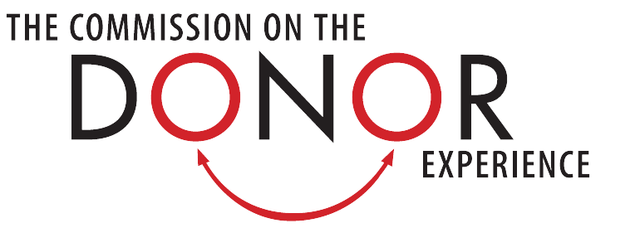CDE project 11e telephone: conclusion and about the authors
- Written by
- The Commission on the Donor Experience
- Added
- April 22, 2017
The telephone, or voice to voice communication in general, should be one of the most effective engagement channels available to charities.
It is a truly one-to-one communication channel at a fraction of the cost of an in-person visit. When done well it can be both personalised and engaging, building increased understanding and support from both sides of the relationship. Therefore, the telephone has a key role to play in enhancing the donor experience with charities and should be utilised for pure engagement and service delivery as well as fundraising. Not every telephone conversation with supporters and donors should contain a fundraising ask.
However, it is also clear from our conversations and research that it is very unevenly appreciated by the charities who use it, and not given either the share of strategic thought or budgetary resource that will allow it to be welcomed by donors, rather than tolerated.
What is of particular concern is the commoditisation of the telephone. An insistence from senior leadership on short-term metrics, such as year one ROI, is stifling innovation and the chance to engage in true relationship building with donors and supporters. The more that charity telephone calls only contain financial asks, the less welcome they become to donors.
Telephone fundraising urgently requires a fresh approach. We recommend you take particular note of the way in which Save the Children has recently rethought all of its telephone activity (p14). But we also commend the other two case studies so generously offered to us, from charities large and small. There is so much more potential in the phone than is being utilised.
Elaine Lee, Managing Director, Reynolds Busby Lee
Adrian Salmon, Vice President, Grenzebach Glier and Associates
About the authors

Elaine Lee MInstF
Managing Director, ReynoldsBusbyLee
elaine@reynoldsbusbylee.com
07768 513 233
An economics and business graduate, Elaine began her career in marketing in the energy sector, as it became highly competitive. From gas to grapes - she joined Direct Wines – the world’s largest mail order wine company. Elaine relished improving the whole customer experience, as well as the way the company communicated internally. Elaine was part of the companies’ first foray into outbound telemarketing in the late 1990s. Elaine then became a marketing analyst and built up her international experience, before moving to Time-Life as European Telemarketing Director where she was responsible for all inbound, outbound and customer service contacts across Europe.
Elaine briefly became Global Telemarketing Director at IMP, before co-founding ReynoldsBusbyLee (RBL) in 2005 a consultancy specialising in customer engagement and customer experience. In 2006 RBL was approached by her first charity to employ her skills from the commercial sector into the charity sector and she has never looked back. Since then RBL has been engaged by over 30 charities in the last 11 years to work on DRTV fundraising campaigns, outbound telephone fundraising campaigns and Customer / Supporter Experience Audits.
Elaine has been a very active member of the DMA's contact centre council helping to set industry guidelines for handling calls with vulnerable adults. Elaine has also co-authored training materials for staff handling contacts from customers / supporters in vulnerable circumstances and is now delivering that training both directly to clients and through the DMA in train-the-trainer workshops. Elaine is a DMA adviser, co-chair of the DMA’s Vulnerable Taskforce, a TPS board member, and a member of the Institute of Fundraising and was appointed as a trustee for Sightsavers in 2016. Previously Elaine was a member of the FRSB’s Advisory Forum.

Adrian Salmon MInstF
Vice President, Grenzebach Glier and Associates
07730 133 339
Adrian Salmon, Vice President, GG+A Europe, joined the firm in April 2015. He brings nearly 20 years of direct marketing fundraising experience in the higher education, arts and culture, and wider not-for-profit spheres.
His particular expertise includes direct mail fundraising, regular giving program management, and management of contributions from integrated mail and online appeals. Most recently, Adrian was Footsteps Fund Manager at the University of Leeds, where he dramatically increased the University’s number of donors, annual giving income, and contributions from integrated mail and online appeals. Adrian also implemented an automated propensity scoring system, the first to be used by a university in the United Kingdom, and designed and implemented the University’s first dedicated 20-seat fundraising call centre.
Prior to joining the University of Leeds, Adrian served for more than nine years with The Phone Room Ltd. as Head of Client Services and as Head of TPR Education. He ran numerous award-winning telephone campaigns for non-profit clients, including the National Galleries of Scotland, Symphony Hall Birmingham, and the South Bank Centre. He also established successful telephone fundraising campaigns for Salford University and Birkbeck College, University of London. Adrian holds a Bachelor of Arts degree in English from the University of Cambridge and is a member of the Institute of Fundraising. Adrian serves on the Advisory Panel of Rogare, the new practitioner-focused fundraising think tank at Plymouth University’s Centre for Sustainable Philanthropy.



















